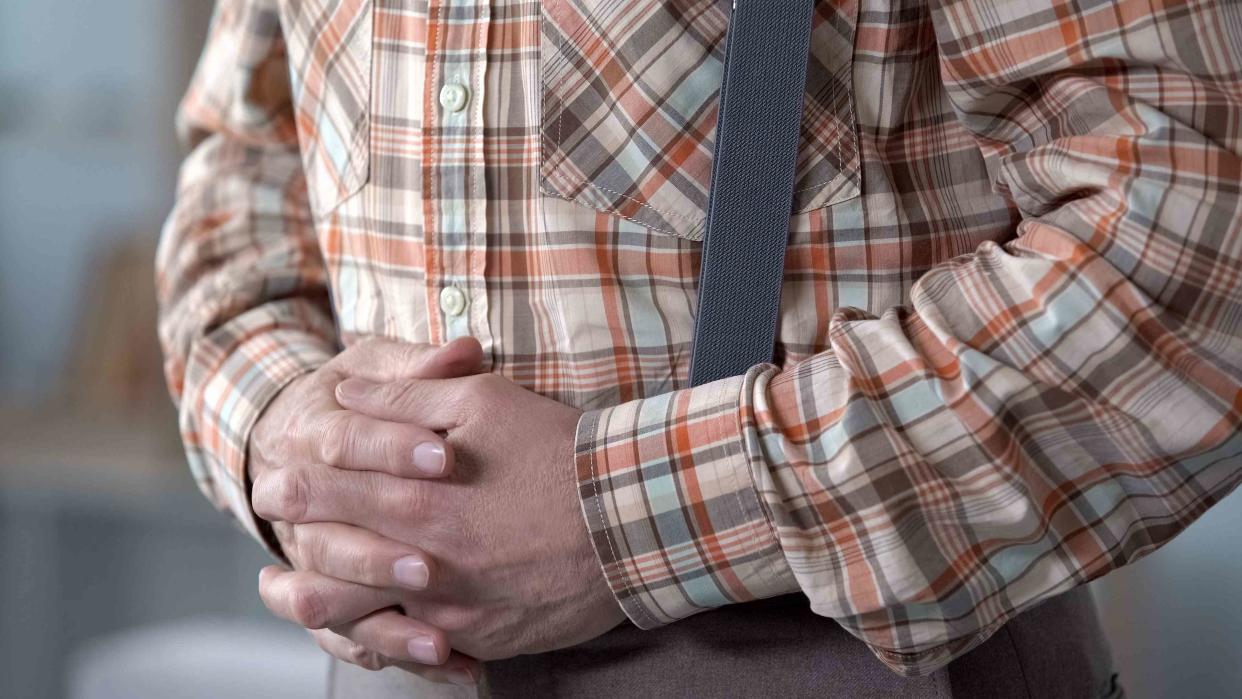What Causes a Hernia?

Motortion / Getty Images
Medically reviewed by Jay N. Yepuri, MD
A hernia is caused by part of an internal organ poking through a hole or area of weakness in a surrounding muscle or tissue wall. Most hernias affect the walls of the abdomen—the part of the body that holds the digestive system, from the diaphragm to the pelvis. This issue is widespread; inguinal hernia—the most common type—was found to affect up to 27% of people assigned male at birth and 3% of people assigned female at birth during their lifetime.
Though the causes of these holes or tears aren’t always clear, hernia has been linked to abdominal strain, aging, birth defects, and certain health conditions, among other factors. In this article, we'll discuss the causes and risk factors of hernias.
Acquired Hernia
Fundamentally, a hernia is a perforation in the abdominal walls, which consist of a layer of muscle and tissue called fascia. Many such cases are “direct” or acquired, meaning that the area of weakness in the fascia forms in your lifetime. As you age, muscles and tissues naturally grow weaker, which, when combined with factors that increase internal pressure, perforate and cause your organs to push out.
Birth Defects
Some people are born with areas of weakness or outright gaps in the abdominal walls; these can both cause several types of hernia. At the root, this is called "umbilical hernia," in which abdominal muscles around the belly button don’t fully form.
Birth defects can also cause certain hiatal hernias, which affect the diaphragm (the band of tissue separating the chest from the abdomen), and inguinal hernia (affecting the groin).

RUTH JENKINSON / Getty Images
Is Hernia Hereditary?
The current consensus is that while there’s a significant genetic component to hernia, they aren’t directly hereditary. This means that genetics can raise your risk but aren’t the direct cause. For instance, a family history of inguinal hernia makes you four times as likely to develop one yourself.
Hernia has been linked to mutations in several genes associated with elastin and collagen production, which are proteins that help tissues in the body maintain shape. These genes include BF2, ADAMTS6, EFEMP1, and WT1.
Who Gets Hernia?
As with other conditions, some people are more likely to develop hernias. These include:
Age
The risk of different types of hernias varies depending on age.
Inguinal hernia is more common in children under 5 and people ages 75-80.
Hiatal hernia is more likely to occur in people age 50 and older.
Umbilical hernia occurs in children under 2 years old 90% of the time.
Incisional hernia, which occurs after abdominal surgery, most commonly affects people ages 30-60.
Epigastric hernia usually affects preschool-age children, with the median age of onset being 39 months.
Femoral hernia is most common in women ages 40-70, but can occur in people of any age.
Sex
In general, people assigned male at birth are more likely than people assigned female at birth to experience a hernia. Men experience approximately 90% of inguinal hernias, which are the most common type. However, women represent 70% of femoral hernia cases, in which intestines poke into the upper thigh.
Risk Factors
Since hernia involves organs pushing out from the abdomen, anything that puts more pressure on the abdominal walls—or weakens those walls—raises your risk. A number of health conditions and lifestyle factors increase your chances of having one.
Abdominal Strain
Abdominal strain—when you tense the surrounding muscles and strain—can also be at the root of a hernia. Pushing while going to the bathroom due to constipation, chronic cough, and sneezing can all have this effect.
Surgery
If you’ve had abdominal or pelvic surgery, you’re also at increased risk of hernia (particularly incisional hernia). Following surgery, the abdominal walls may not heal completely or become weakened. This is a relatively common complication, occurring after up to 20% of surgeries involving the abdomen, or laparotomies.
Pregnancy
The hormones your body releases when you’re pregnant affect your body’s production of collagen, weakening abdominal walls. In addition, pressure in the abdomen can rise as the fetus grows.
Obesity or Excess Weight
Excess weight puts pressure on the organs in your abdomen, making them more likely to push out. Obesity—defined as a body mass index (BMI) of 30 or above—can also put extra strain on the abdominal walls.
Disclaimer: Body Mass Index, or BMI, is a biased and outdated metric that uses your weight and height to make assumptions about body fat, and by extension, your health. This metric is flawed in many ways and does not factor in your body composition, ethnicity, sex, race, and age. Despite its flaws, the medical community still uses BMI because it’s an inexpensive and quick way to analyze health data.
Heavy Lifting
Muscular overexertion, especially lifting heavy objects, puts additional pressure on the inside of the abdomen. If there’s a weak spot in the abdominal walls, this pushes the stomach, intestines, or esophagus through.
Heavy lifting on its own is not likely to cause a hernia. It can, however, develop with persistent overexertion. People who regularly lift weights should take extra care to ensure they aren't developing a hernia over time.
Tobacco Use
Along with many other negative health effects, smoking or using tobacco raises your risk of hernia. This habit also makes it more likely for hernia to come back. Nicotine use affects your ability to produce collagen, making abdominal walls weaker.
Related: What You Need to Know About Quitting Smoking
Undescended Testicles
The risk of inguinal hernia rises in cases of undescended testicles. This is when one or both testicles fail to move into the scrotum before birth.
Certain Diseases
Several other health conditions are associated with higher rates of hernia, including:
Chronic obstructive pulmonary disease (COPD), which encompasses breathing disorders such as emphysema and chronic bronchitis
Ehlers-Danlos syndrome, an inherited genetic disorder of the connective tissues that causes people to have abnormally long legs, arms, and fingers
Marfan syndrome, another inherited disorder that affects connective tissues
Cystic fibrosis, a severe genetic disease that causes mucus build-up in the lungs and digestive system, among other organs
Ascites, or fluid buildup in the abdomen
Enlarged prostate
A Quick Review
When you have a hernia, internal organs such as the intestines or stomach push out through weak spots in the abdominal walls. A majority of hernias arise later in life, though up to one-third of cases are due to birth defects. Risk factors for this condition include heavy lifting or straining, chronic constipation, excess weight, and pregnancy, among others.
For more Health.com news, make sure to sign up for our newsletter!
Read the original article on Health.com.

